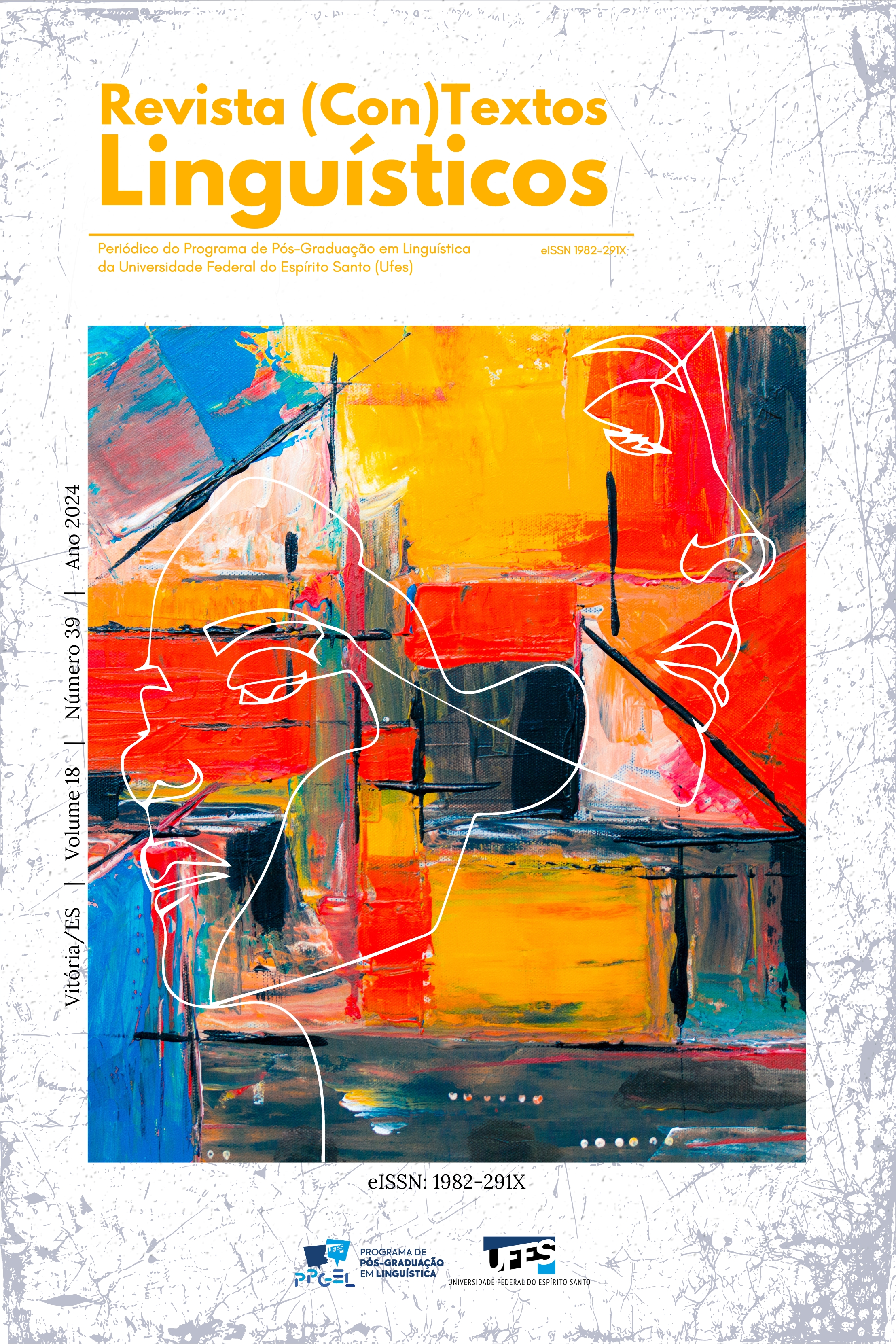Lexicon and Social Imaginary
Analysis of the denominations attributed to prostitute in the State of Maranhao
DOI:
https://doi.org/10.47456/rctl.v18i39.43866Keywords:
Lexicon, Social imaginary, Prostitute, MaranhaoAbstract
This ongoing work aims to analyze the denominations attributed to prostitutes and understand how the lexicon reflects collective social imagery and the ideology of a community. The choice of this theme is justified by its relevance in understanding how the lexicon related to prostitution carries cultural and ideological views ingrained in our society, reflected through words and expressions. In this sense, the research hypothesizes that the names given to prostitutes reflect the dominant view regarding women's image and sexuality in society. The lexical variation concerning prostitutes reveals diverse social and cultural attitudes within the community. Regarding methodological procedures, the study is based on data obtained from the Linguistic Atlas of Maranhão Project (ALiMA), specifically focusing on question 139 of the semantic-lexical questionnaire (QSL), "What is the name for a woman who sells herself to any man?" The research is grounded in the theoretical and methodological assumptions of Dialectology, Geosociolinguistics, Lexicology, and Imaginary. Dialectology and Geosociolinguistics provide tools to map regional and social lexical variation. Lexicology aids in the analysis of term meaning and usage, while the theory of Imaginary allows exploration of how cultural and social representations influence language. Partial data collected show significant lexical variation concerning the investigated lexical item, with 26 variants and 126 occurrences recorded. Analyzing the denominations like "meretriz" (prostitute), "mundana" (worldly woman), and "piriguete" (slut), it becomes evident that these terms and their usage in Maranhão's lexicon reflect an ideology permeating the state's social imaginary, where female sexuality outside marriage is frowned upon. Thus, it highlights the intrinsic relationship between language and society, where the lexicon, in this case, reflects the viewpoint of a specific community.
Downloads
References
ALVES, J. E. D. A Linguagem e as representações da masculinidade. Rio de Janeiro: Escola Nacional de Ciências Estatísticas, 2004.
AULETE, C. Novíssimo Aulete dicionário contemporâneo da língua portuguesa. Rio de Janeiro: Lexikon, 2011.
BIDERMAN, M. T. Teoria Linguística: Linguística Quantitativa e Computacional. São Paulo: Martins Fontes, 2001.
CARDOSO, S. A. Geolinguística: tradição e modernidade. São Paulo: Parábola Editorial, 2010.
CASTORIADIS, C. A instituição imaginária da sociedade. Rio de Janeiro: Paz e Terra, 2010.
COROA, M. L. Para que serve um dicionário? In: CARVALHO, O. L. S.; BAGNO, M. (org.). Dicionários Escolares: políticas, formas & usos. São Paulo: Parábola Editorial, 2011. p. 61-72.
FIGUEIREDO, C. Dicionário da Língua Portuguesa de Cândido de Figueiredo. Lisboa: Livraria Bertrand, 1947.
HOUAISS, A.; VILLAR, M. S. Dicionário eletrônico Houaiss da língua portuguesa. Rio de Janeiro: Objetiva, 2009.
KRIEGER, M. G. O dicionário de língua como potencial instrumento didático. In: ISQUERDO, A. N.; ALVES, I. M. (org.). As ciências do léxico: lexicologia, lexicografia e terminologia. Vol. III. Campo Grande: EDUFMS, 2007. p. 295-309.
LAKOFF, R. Linguagem e lugar da mulher. In: FONTANA, B.; OSTERMANM, A. C. (org.). Linguagem, gênero, sexualidade: clássicos traduzidos. São Paulo: Parábola Editorial, 2010. p. 109-127.
LOPE BLANCH, J. M. Polimorfismo dialectal en el atlas lingüístico de México (ALMex). Estudios de Lingüística Aplicada, n. 15/16, p. 29-34, 1992.
MORAES, A. F. Gabriela Leite e mudanças nas práticas discursivas sobre prostituição no Brasil. Estudos Históricos, Rio de Janeiro, v. 33, n. 70, p. 254–279, 2020.
OLIVEIRA, A. M. P. P. de; ISQUERDO, A. N. Apresentação. In. OLIVEIRA, A. M. P. P.; ISQUERDO, A. N. As ciências do léxico: lexicologia, lexicografia e terminologia. Campo Grande: EDUFMS, 2001. p. 9-11.
ORLANDI, E. P. Análise de Discurso: princípios e procedimentos. 11. ed. Campinas: Pontes Editores, 2013.
ORLANDI, E. P. Discurso, imaginário social e conhecimento. Em Aberto, Brasília, ano 14, n. 61, p. 53-59, 1994.
PRADA, M. Putafeminista. São Paulo: Veneta, 2018.
RAZKY, A. A Dimensão Sociodialetal do Léxico no Projeto Atlas Linguístico do Brasil. Signum: Estudos da Linguagem, Londrina, n. 16/2, p. 247-270, 2013. DOI: https://doi.org/10.5433/2237-4876.2013v16n2p247.
SERRA, L. H.; SILVEIRA, T. S. A profissional do sexo no léxico do português falado na amazônia legal: discutindo imagens femininas na sociedade. EntreLetras, [S. l.], v. 15, n. 1, p. 8–29, 2024. Disponível em: https://periodicos.ufnt.edu.br/index.php/entreletras/article/view/18139. Acesso em: 18 jul. 2024.
SILVA, M. S. A prostituição feminina: um percurso e algumas reflexões. Revista Terceiro Milênio, Campos dos Goytacazes, v. 01, n. 01, p. 109 - 121, 2014. Disponível em: https://revistaterceiromilenio.uenf.br/index.php/rtm/article/view/74. Acesso em: 15 jul. 2024.
SANTOS, F. G. V.; SOARES, S. S. F. A Pomba-Gira no imaginário das prostitutas. Revista Homem, Espaço e Tempo, [S. l.], v. 1, n. 1, 2018. Disponível em: http://rhet.uvanet.br/index.php/rhet/article/view/22. Acesso em: 13 jul. 2024.
ZAVAGLIA, C. Sexismo em dicionários brasileiros. In: MOREIRA, G. L.; COSTA, L. A. C; ALVES, I. M. (org.). Pesquisas em Lexicologia, Lexicografia e Terminologia. Campinas: Pontes Editores, 2022. p. 127-150.
Downloads
Published
Issue
Section
License
Copyright (c) 2024 Revista (Con)Textos Linguísticos

This work is licensed under a Creative Commons Attribution-NonCommercial 4.0 International License.
Authors assign the copyright of the article to the publisher of Revista (Con)Textos Linguísticos (Graduate Program in Linguistics, Ufes), if the submission is accepted for publication. Responsibility for the content of articles rests exclusively with their authors. The full or partial submission of the text already published in this periodical to any other periodical is prohibited.
This work is licensed under a Creative Commons Attribution-NonCommercial 4.0 International License.



